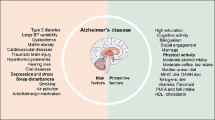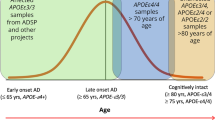Abstract
Large-scale genome-wide association studies (GWAS) have revealed that the ABCA7 rs3764650 polymorphism (or its proxies, namely rs115550680, rs3752246, and rs4147929) is associated with Alzheimer’s disease (AD) susceptibility in individuals of Caucasian ancestry. The following studies have investigated this finding in Chinese (N = 633 and N = 1,224), Japanese (N = 1,735), Korean (N = 844), African American (N = 5,896), and Canadian (N = 1,104) populations. However, these studies reported a weak or negligible association. We hypothesized that these negative results may have been caused by either relatively small sample sizes compared with those used for the previous GWAS in individuals of Caucasian ancestry or the genetic heterogeneity of the rs3764650 polymorphism (or its proxies) in different populations. Here, we reevaluated the association between rs3764650 and AD using large-scale samples from 18 previous studies (N = 79,381—30,590 cases and 48,791 controls) by searching PubMed, AlzGene, and Google Scholar databases. Using allele, dominant, recessive, and additive models, we did not identify significant heterogeneity among the 18 studies. We observed a significant association between rs3764650 and AD using the allele (P = 1.76E − 26, odds ratio (OR) = 1.21, 95 % confidence interval (CI) 1.17–1.26), dominant (P = 4.00E − 04, OR = 1.17, 95 % CI 1.07–1.28), recessive (P = 3.00E − 03, OR = 1.43, 95 % CI 1.13–1.81), and additive models (P = 3.00E − 03, OR = 1.49, 95 % CI 1.16–1.91). Collectively, our analysis further supports previous findings that the ABCA7 rs3764650 polymorphism is associated with AD susceptibility. We believe that our findings will be very useful for future genetic studies on AD.




Similar content being viewed by others
References
Saloni T (2013) Priority medicines for Europe and the world. “A public health approach to innovation”. World Health Organization: 11
Lambert JC, Grenier-Boley B, Chouraki V, Heath S, Zelenika D et al (2010) Implication of the immune system in Alzheimer’s disease: evidence from genome-wide pathway analysis. J Alzheimers Dis 20:1107–1118
Seshadri S, Fitzpatrick AL, Ikram MA, DeStefano AL, Gudnason V et al (2010) Genome-wide analysis of genetic loci associated with Alzheimer disease. JAMA 303:1832–1840
Hollingworth P, Harold D, Sims R, Gerrish A, Lambert JC et al (2011) Common variants at ABCA7, MS4A6A/MS4A4E, EPHA1, CD33 and CD2AP are associated with Alzheimer’s disease. Nat Genet 43:429–435
Lambert JC, Heath S, Even G, Campion D, Sleegers K et al (2009) Genome-wide association study identifies variants at CLU and CR1 associated with Alzheimer’s disease. Nat Genet 41:1094–1099
Harold D, Abraham R, Hollingworth P, Sims R, Gerrish A et al (2009) Genome-wide association study identifies variants at CLU and PICALM associated with Alzheimer’s disease. Nat Genet 41:1088–1093
Naj AC, Jun G, Beecham GW, Wang LS, Vardarajan BN et al (2011) Common variants at MS4A4/MS4A6E, CD2AP, CD33 and EPHA1 are associated with late-onset Alzheimer’s disease. Nat Genet 43:436–441
Reitz C, Jun G, Naj A, Rajbhandary R, Vardarajan BN et al (2013) Variants in the ATP-binding cassette transporter (ABCA7), apolipoprotein E 4, and the risk of late-onset Alzheimer disease in African Americans. JAMA 309:1483–1492
Lambert JC, Ibrahim-Verbaas CA, Harold D, Naj AC, Sims R et al (2013) Meta-analysis of 74,046 individuals identifies 11 new susceptibility loci for Alzheimer’s disease. Nat Genet 45:1452–1458
Johnson AD, Handsaker RE, Pulit SL, Nizzari MM, O’Donnell CJ et al (2008) SNAP: a web-based tool for identification and annotation of proxy SNPs using HapMap. Bioinformatics 24:2938–2939
Vasquez JB, Fardo DW, Estus S (2013) ABCA7 expression is associated with Alzheimer’s disease polymorphism and disease status. Neurosci Lett 556:58–62
Shulman JM, Chen K, Keenan BT, Chibnik LB, Fleisher A et al (2013) Genetic susceptibility for Alzheimer disease neuritic plaque pathology. JAMA Neurol 70:1150–1157
Karch CM, Jeng AT, Nowotny P, Cady J, Cruchaga C et al (2012) Expression of novel Alzheimer’s disease risk genes in control and Alzheimer’s disease brains. PLoS One 7:e50976
Tan L, Yu JT, Zhang W, Wu ZC, Zhang Q et al (2013) Association of GWAS-linked loci with late-onset Alzheimer’s disease in a northern Han Chinese population. Alzheimers Dement 9:546–553
Liu LH, Xu J, Deng YL, Tang HD, Wang Y, et al. (2013) A complex association of ABCA7 genotypes with sporadic Alzheimer disease in Chinese Han population. Alzheimer Disease and Associated Disorders
Chung SJ, Lee JH, Kim SY, You S, Kim MJ et al (2013) Association of GWAS top hits with late-onset Alzheimer disease in Korean population. Alzheimer Dis Assoc Disord 27:250–257
Miyashita A, Koike A, Jun G, Wang LS, Takahashi S et al (2013) SORL1 is genetically associated with late-onset Alzheimer’s disease in Japanese, Koreans and Caucasians. PLoS One 8:e58618
Omoumi A, Fok A, Greenwood T, Sadovnick AD, Feldman HH et al (2014) Evaluation of late-onset Alzheimer disease genetic susceptibility risks in a Canadian population. Neurobiol Aging 35(4):936.e5–936.e12
Logue MW, Schu M, Vardarajan BN, Buros J, Green RC et al (2011) A comprehensive genetic association study of Alzheimer disease in African Americans. Arch Neurol 68:1569–1579
Clark MF, Baudouin SV (2006) A systematic review of the quality of genetic association studies in human sepsis. Intensive Care Med 32:1706–1712
Lv H, Jiang Y, Li J, Zhang M, Shang Z et al (2014) Association between polymorphisms in the promoter region of interleukin-10 and susceptibility to inflammatory bowel disease. Mol Biol Rep 41(3):1299–1310
Lewis CM, Knight J (2012) Introduction to genetic association studies. Cold Spring Harb Protocol 2012:297–306
Liu G, Zhang S, Cai Z, Ma G, Zhang L et al (2013) PICALM gene rs3851179 polymorphism contributes to Alzheimer’s disease in an Asian population. Neuromol Med 15:384–388
Jiang Y, Zhang R, Zheng J, Liu P, Tang G et al (2012) Meta-analysis of 125 rheumatoid arthritis-related single nucleotide polymorphisms studied in the past two decades. PLoS One 7:e51571
Liu G, Zhang S, Cai Z, Li Y, Cui L et al (2013) BIN1 gene rs744373 polymorphism contributes to Alzheimer’s disease in East Asian population. Neurosci Lett 544:47–51
Liu G, Zhang L, Feng R, Liao M, Jiang Y et al (2013) Lack of association between PICALM rs3851179 polymorphism and Alzheimer’s disease in Chinese population and APOEepsilon4-negative subgroup. Neurobiol Aging 34(1310):e1319–1310
Jin C, Li W, Yuan J, Xu W, Cheng Z (2012) Association of the CR1 polymorphism with late-onset Alzheimer’s disease in Chinese Han populations: a meta-analysis. Neurosci Lett 527:46–49
Liu G, Wang H, Liu J, Li J, Li H et al (2014) The CLU gene rs11136000 variant is significantly associated with Alzheimer’s disease in Caucasian and Asian populations. Neuromol Med 16:52–60
Bertram L, McQueen MB, Mullin K, Blacker D, Tanzi RE (2007) Systematic meta-analyses of Alzheimer disease genetic association studies: the AlzGene database. Nat Genet 39:17–23
Acknowledgments
This work was supported by funding from the National Nature Science Foundation of China (grant numbers 81300945, 31200934, 31301938, 31171219, 81271213, 81070878, 81271214, and 81261120404), the Natural Science Foundation of Guangdong Province, China (No. S2012010008222), and the Science and Technology Innovation Fund of Guangdong Medical College (No. STIF 201101).
Conflict of Interest
None.
Author information
Authors and Affiliations
Corresponding authors
Additional information
Guiyou Liu, Fujun Li, and Shuyan Zhang contributed equally to this work.
Electronic supplementary material
Below is the link to the electronic supplementary material.
ESM 1
(DOC 337 kb)
Rights and permissions
About this article
Cite this article
Liu, G., Li, F., Zhang, S. et al. Analyzing Large-Scale Samples Confirms the Association Between the ABCA7 rs3764650 Polymorphism and Alzheimer’s Disease Susceptibility. Mol Neurobiol 50, 757–764 (2014). https://doi.org/10.1007/s12035-014-8670-4
Received:
Accepted:
Published:
Issue Date:
DOI: https://doi.org/10.1007/s12035-014-8670-4




